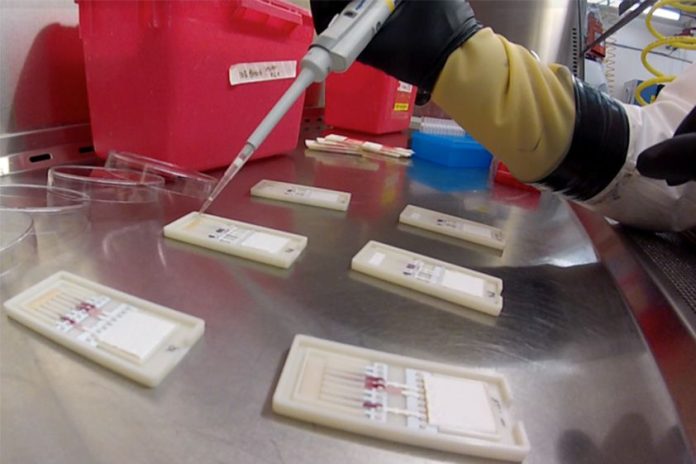A test for Ebola that takes 10 minutes and can discriminate between Ebola, dengue fever, and yellow fever has been reported by researches at the Massachusetts Institute of Technology Institute for Medical Engineering and Science. The new test promises much faster triage in the field for viral hemorrhagic fevers than was possible before.
The technology is based on lateral flow technology. The technology is used in pregnancy tests. A strip of paper is coated in stripes containing different sized nanoparticles that change colors in the presence of the three different viruses. The nanoparticles are attached to antibodies that recognize Ebola, dengue fever, and yellow fever. The test takes 10 minutes. A person that cannot distinguish color visually can use a phone program or a computer program that can see color.
The test is planned to be used in the field in countries where Ebola, dengue fever, and yellow fever are prevalent. The previous method of determining the disease that a person may have takes two days. Many of the countries where the three diseases are prevalent do not have the equipment to perform the needed testing for the diseases. The most accurate method for detecting Ebola with no chance of error is polymerase chain reaction technology. The new test only requires a drop of blood serum and is just as accurate as polymerase chain reaction technology.
The technology has been four years in development and was originally intended for other infectious diseases. The researchers are hoping for a fast approval by the U. S. FDA in order to use the technique in areas where Ebola is still active. A faster diagnosis means faster treatment and fewer deaths in the next outbreak of Ebola. Similar results can be expected for dengue fever and yellow fever.
The efficacy of this new technology could be used advantageously in more affluent countries during the next outbreak of Ebola. All one needs are the test strips, blood samples from people suspected of being exposed to Ebola, and a centrifuge to obtain serum from blood. An entire apartment complex or a community could be tested and cleared or tested and hospitalized in a matter of hours. The idea is epidemic control on a mass scale in minutes.















